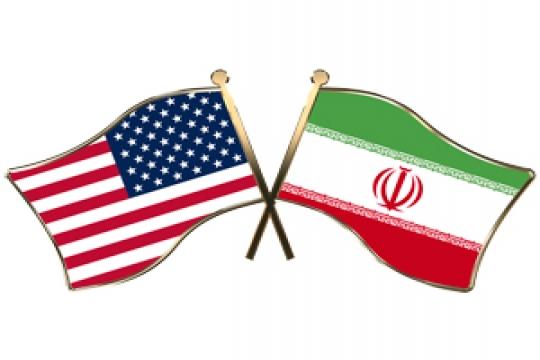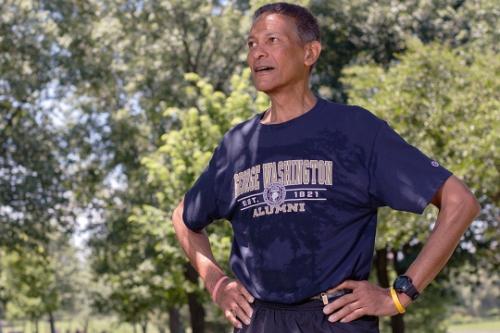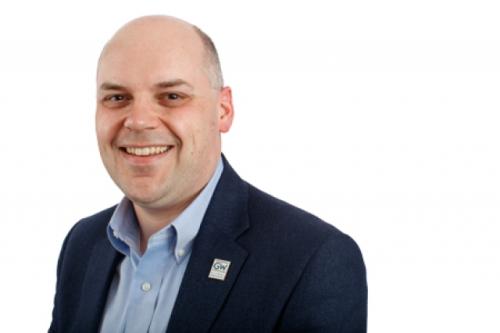An Insight Into Iran
The United States and other world powers reached a landmark agreement with Iran in July to prevent the Middle Eastern nation from obtaining a nuclear weapon, in exchange for lifting sanctions that for years have kept Iran on the sidelines of global commerce.
Official contact between Iran and the West has been limited for decades, but in 2013, the Iranian people elected Hassan Rouhani president, and he's made it a priority to improve Iran's foreign relations.
Sahar Nowrouzzadeh, BA '05, is one of the directors for Iran on the White House's National Security Council, and a few weeks before the final agreement was announced, Ms. Nowrouzzadeh chatted with GW Magazine and offered perspective on her career and the historic talks.
Q: Official contact between the United States and Iran has been limited since the Iranian Revolution in 1979. How significant are these talks?
Despite the difficult history and array of significant differences between the U.S. and Iran, the nuclear negotiations offer a real opportunity to, through diplomacy, reduce tensions over the nuclear issue and achieve a core national security objective diplomatically. As someone who has studied Iran for many years and worked on Iran for the U.S. government for over a decade now, I've witnessed firsthand—and so have many of my colleagues—the various peaks and lulls in our interactions with Iran.
For example, Secretary of State John Kerry meeting regularly and constructively with his Iranian counterpart—people take it for granted now, but up until a year and a half or two years ago, that hadn't happened for over 30 years. Of course, even if the nuclear issue is resolved, we will still have significant differences with Iran, but the point is that such engagement has become a bit normalized on both sides as part of this process and proven to be productive, which is significant.
Q: Do you ever think about your place in history?
The pace of our work is so intense, and because what we're doing involves such high stakes, it's hard to take a step back to absorb these truly historic moments. At the end of the day, there is no doubt that what President Obama and our entire team is doing could be historic in terms of resolving one of our most serious national security concerns peacefully.
And if ultimately successful, I truly believe this period will be remembered as a great victory for diplomacy in world history. It's an honor to serve my country and be a part of that history.
Q: Your brother is an active-duty Navy doctor and served in Iraq in 2005-06. How did that influence you?
I, like many other Americans—and particularly those of us who have directly supported our war fighters or those of us who have war veterans in our families—understand the tremendous costs of military conflict. I don't want to see any of my loved ones deployed into a war zone again unless absolutely necessary and unless diplomacy has been exhausted.
Q: Most of us think of the NSC as a serious place—and it is. But not always.
When we're video conferencing with folks, when I come in, I pretty much always feel the need to wave hello to the people on the screen because I think it's rude if I don't. A few of my co-workers have pointed out, "You don't always have to wave at the screen. Just sit down and wait for the meeting to start." And I tell them, "I just think it's rude to not say hello." I'm also pretty big on highfives. At the NSC, folks aren't necessarily big on high-fives, although fist bumps are pretty popular. I'm a fan of those, too.
- NAME - Sahar Nowrouzzadeh, BA '05
- AGE - 32
- HOMETOWN - Trumbull, Conn.
- CURRENTLY - A director for Iran on the NSC staff
- FORMERLY - Department of Defense team chief/lead foreign affairs analyst and Department of State foreign affairs analyst officer
- RELEVANT LIFE EXPERIENCE - Daughter of Iranian immigrants who came to the U.S. nearly 50 years ago when her father began his residency as an OB-GYN, speaks several languages, including Persian/Farsi, master's degree in Persian studies from the University of Maryland
- LESS RELEVANT LIFE EXPERIENCE - While in high school, introduced a Jay-Z music video on MTV's Total Request Live; founder of a now defunct Middle Eastern infused hip-hop GW dance group, Aatash
More Alumni News
Life in Stride
With more than a hundred marathons underfoot, and counting, George Banker, BBA ’84, keeps his focus on the long haul: 50-mile “ultramarathons” and a sweatshirt that money can’t buy.
Navy Diver Competes on Blind Date Edition of Amazing Race
Blair Townsend, MD '12, is a man of adventure and tan year-round. He's climbed Kilimanjaro, he's skydived. He's also a Navy diver.
This Is: Jeremy Gosbee, BA '98, MBA '02
Mr. Gosbee is president of the GW Alumni Association Board of Directors. He succeeded Steve Frenkil, BA '74, in June and has been on the board since 2003.





